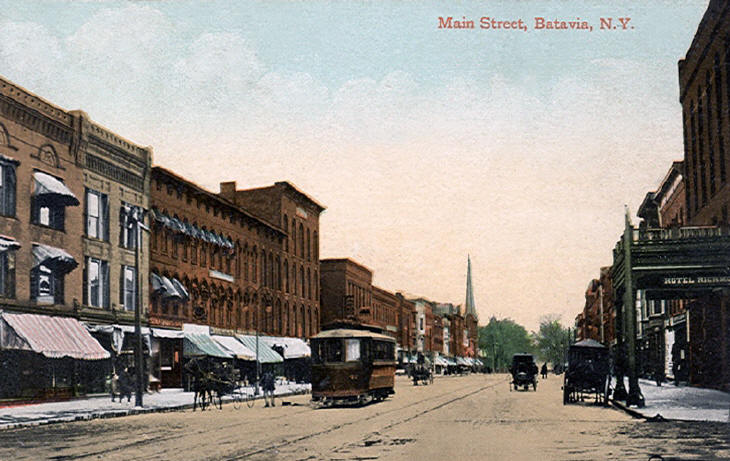The missus and I were glad to be in Jackson, Michigan, at the Grand River Brewery, for a set of presentations sponsored by The American Conservative. We heard Bill Kauffman, who is arguably conservatism’s funniest voice. Here’s an excerpt:
My hometown, Batavia, New York, population 15,500, has had plenty of Bill Baileys and Hughie Cannons over the years. I don’t mean by that shiftless drunks, daydreaming musicians, guys who stay out all night—they’re okay by me—but rather people who leave town, or who refuse to make a home in the place where they live. They reject Booker T. Washington’s wise injunction to cast down your bucket where you are.
In 2003 I published a book called Dispatches From the Muckdog Gazette, which is, megalomaniacally, a memoir about my repatriation to Batavia, but it’s also about the way that Batavia—and by extension all the Batavias from sea to dimming sea—has struggled to maintain a distinct identity, a character, rather than becoming just another formless wattle on the continental blob.
To the world, Batavia is merely Exit 48 on the New York State Thruway, that hideous gray scar across our green and lovely state, that drab version of the Erie Canal dedicated to that drab man Thomas E. Dewey, who fled his fine little hometown of Owosso, Michigan, which was too small to contain a man of his talent, or ego.
I don’t know how much anyone here knows of Batavia—I’m afraid we keep our little light well hidden under the bushel—but I will skip lightly over the first 160 or so years of our history and say only that it is rich, mythopoeic, beguilingly strange, as befits the cradle of the Anti-Masons, the first third party in American history.
Batavia was a prosperous little city, manufactory of combines and tractors and shotguns. English and Scots and Germans were the early settlers, coexisting uneasily with the late 19th-century polyglot influx of Italians and Poles. I’m a mongrel, a mixture of several of these streams—though my beloved late Italian grandmother insisted that we were “northern Italian—almost Swiss.” So in my book I gave myself license to write freely, even raucously, of the ethnic conflicts that once cleaved Batavia—but also gave it a good deal of its spice.
In some ways we were a typical small American city but in other ways we were “Batavia”—our own place. We did not yet bow down before the new American royalty: Burger King and Dairy Queen.
Then, as Joseph Heller would say, something happened. Urban renewal. My old boss Senator Pat Moynihan once said, when driving through Auburn, New York, which was decimated rather as Batavia was—I would do my Moynihan impression but I’m afraid I teetotaled at the reception—“in the 1950s, with a progressive government and newspaper, you got into urban renewal and destroyed everything of value in your town. If you’d had a reactionary newspaper and a grumpy mayor, you might still have it.” (Try to imagine any U.S. senator today saying something one ten-thousandth as perceptive.)


Thanks for trying to something of the job of reactionary scribe yourself..
LikeLike
O’course, Jackson is also the home of the Michigan “state correctional institution”, as well. Maybe bits and pieces of this dialog spill over to this little bit of 150 year history…
LikeLike
John 4: 11 “Sir,” said the woman, “You don’t even have a bucket, and the well is deep. So where do You get this ‘living water’? 12 You aren’t greater than our father Jacob, are You? He gave us the well and drank from it himself, as did his covenant successors
19 “Sir,” the woman replied, “I see that You are a prophet. 20 Our fathers worshiped on this mountain, yet you Jews say that the place to worship is in Jerusalem.” 21 Jesus told her, “Believe Me, woman, an hour is coming when you will worship the Father neither on this mountain nor in Jerusalem. 22 You Samaritans worship what you do not know. We worship what we do know, because salvation is from the Jews. 23 But an hour is coming, and is now here, when the true worshipers will worship the Father in spirit and truth.
The link for Kaufman http://www.theamericanconservative.com/urbs/loyalty-to-place-can-renew-american-towns/
LikeLike
Is it Lutheran to break the non-mosaic (“moral law”) sabbath in order to worship and witness on TV?
https://www.washingtonpost.com/news/acts-of-faith/wp/2017/09/24/colin-kaepernick-vs-tim-tebow-a-tale-of-two-christianities-on-its-knees/
LikeLike
All cities, towns, villages, and rural areas exist within a context. And it is a mistake to think any area can choose to be impervious to change as its context changes.
LikeLike
Curt, right, and some of the context is federal policy.
LikeLike
D.G.,
It always has been. And?
LikeLike